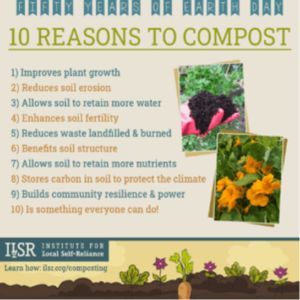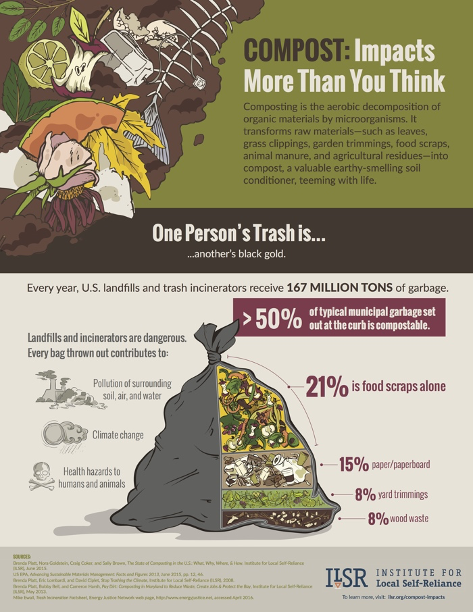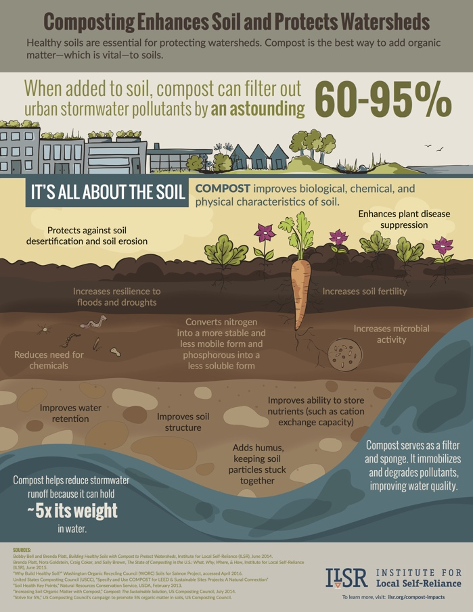What is Compost and What are its Benefits?

Composting is collecting organic matter (plant material, food scraps, anything that was once alive) in one place to speed up the microbial decomposition process. Natural decomposition happens every day over time— at farms, in forests, in your front yard, in the park, etc. — but composting can be done in your backyard, in your house, or on larger scales such as community and commercial scales. There are many benefits to composting.
Composting as a waste management strategy is to compost your food scraps and yard waste to keep organic matter out of the landfill. This is beneficial because organic matter in a landfill does not decompose. Landfills compact garbage, which excludes the air and water that would be necessary for decomposition. Instead, organic matter in landfills utilize anaerobic digestion to produce and release methane gas and other harmful gases. It is known that about 40% of America’s waste stream is organic matter. Instead of sending this waste to the landfill, individuals can compost their organic waste to save valuable landfill space and reduce greenhouse gas emissions.
While the process of composting is beneficial, finished compost is also beneficial because it acts as a natural fertilizer and is a beneficial soil amendment. Nutrients from composted food scraps remain in the compost and boost plant growth when the compost is applied to house plants, a garden, or even a yard.


Composting at Home
There are two main ways to compost at home. The first is generally referred to as “backyard composting” and is where organic matter is collected in a pile outside. The second is called Vermicomposting, which uses worms in a bin and can be kept inside.
Backyard Composting
Backyard composting is collecting your food scraps in a pile that uses aerobic digestion and heat to speed up decomposition. There are many ways to backyard compost that range from low to high maintenance.
Start with a bin: A store-bought bin works great. There are many kinds, so pick one that best meets your needs. You can make your bin out of wooden pallets, hardware wire, or other materials. Alternatively, you can make a pile on the ground and not use a bin at all. The type of bin you choose will depend on your backyard and your aesthetics. In any case, the bin will need to be at least 3 cubic yards in size to ensure it can generate heat and will also need to accommodate for airflow to ensure aerobic digestion is possible.
Once you have your bin, you can start layering “brown” and “green” material. Green material is rich in nitrogen and includes moist materials such as food scraps and freshly cut yard waste, including unfertilized grass clippings. Brown material is rich in carbon and includes dried yard waste, woodchips, and paper products (newspaper, paper egg cartons, etc.). When you add to your compost pile, you will need to add more brown material than green material (3:1 ratio). It is best to input small pieces of food scraps and yard waste when adding to the pile. This will create more surface area and and will speed up the decomposition process.
What Not to Put in Your Compost
- Big, thick branches
- Carnivorous animal or human feces
- Animal products like meat, bones, or dairy
- Fat, oil, or grease
Throughout your composting process, be aware of your pile’s water content. The compost should feel as moist as a squeezed-out sponge. If your pile is too dry, add water. If your pile is too wet, add brown material. The insects in your compost pile can serve as signs of a healthy compost pile as well. For example, ants prefer a drier environment, while gnats are a sign of excess moisture. If your ratio of brown to green material is correct, your compost pile should not smell. If it does smell, try adding brown material and turning your pile.
Additional Resources:
- Composting — The M.e.t. (metrecycle.com)
- Backyard Composting in Oklahoma - https://extension.okstate.edu/fact-sheets/print-publications/hla/backyard-composting-in-oklahoma-hla-6448.pdf
- Composting: A great way to make the most of your leaves - https://extension.okstate.edu/fact-sheets/print-publications/l/recycling-yard-waste-don-t-bag-it-leaf-composting-l-252.pdf
- OSU Extension’s Master Composter Program in Oklahoma City (https://agriculture.okstate.edu/departments-programs/hla/research-extension/master-gardener/)
- Green County Master Composters Group in Tulsa: https://www.tulsamastergardeners.org/classes-and-events-2/master-composter-1.html; https://www.facebook.com/mastercomposting/
Vermicomposting (Worm Composting)
Vermicomposting is the process of composting with Red Wriggler worms to speed up decomposition. It is important to use the Red Wriggler species because they live in the top 5-10 inches of soil in nature, which is why they are able to survive in a bin. Other species of worm live deeper in the soil. The worms produce vermicast (or worm castings), which create a particularly nutrient-rich soil.
Vermicompost is typically used to compost food scraps and not yard waste. It is typically done in a small bin (think a plastic storage bin) and can be kept inside, which is perfect for an apartment setting.
You can purchase worms and a starter kit at www.unclejimswormfarm.com.
Additional Resources:
- Vermicomposting: Composting with worms - https://extension.okstate.edu/fact-sheets/print-publications/bae/vermicomposting-composting-with-worms-bae-1742.pdf
- OCASA’s Vermicompost 101: Making a worm bin can be messy (and fun!) so make sure you're in a space that you won't mind getting a little dirty! A garage or backyard is a great space to work. Gathering all your supplies beforehand will help streamline the process. (okcompostconference.org)
Community Composting in Oklahoma
Community composting can be a good option if you don’t have space or time to compost on your own. It can be a great place to start composting. Community composting is often coupled with community gardens, schools, community centers, etc.
If you are interested in starting community composting, check out the Institute if Local Self Reliance’s (ILSR) resources and guides: https://ilsr.org/community-composting-101-certificate-course/
Some OKC area community composters are Commonwealth Urban Farm, Lillian Timbers Farms, and Oklahoma City Beautiful’s school garden program.
Some community composters in Tulsa include Kitty Gang (Kittygang.org).
Community composters are often looking for volunteers and are happy to work with newcomers.
Large-Scale/Commercial Composting in Oklahoma
There are some compost facilities in Oklahoma that do not collect food waste, but do accept yard waste, sludge, and/or manure. You can find those facilities here: https://deq.maps.arcgis.com/home/webmap/viewer.html?webmap=828cd4dd8c8b494383ac825ad3347181
There are limited commercial composting options in Oklahoma to compost food waste. Fertile Ground (https://www.fertilegroundok.coop/) is an option for the Oklahoma City area.
If you are interested in composting on a commercial scale, contact Anne Marie Smith () of the Department of Environmental Quality for permitting information, or visit https://www.ag.ok.gov/aems/compost.htm for agricultural composting information.
The Oklahoma Compost and Sustainability Association (OCASA) https://okcomposts.org/
OKRA supports OCASA as Oklahoma’s composting experts. Join OCASA to stay up to date with their events (community classes, Compost Festival, Compost Conference) and to stay connected in Oklahoma’s compost community.
International Compost Awareness Week (ICAW)
ICAW is the first full week of May each year. OCASA typically hosts events and a Compost Festival in Oklahoma City.
https://www.compostfoundation.org/ICAW/ICAW-Home
Additional Resources
- Sustainability Alliance:
https://sustainabletulsainc.org/okgreenliving/compost/
- Prairie Dirt Solutions – Sells compost, accepts landscaping waste, and more: https://prairiedirtsolutions.com/
- Compost - https://extension.okstate.edu/programs/solid-waste-management/composting/
Factsheets
- Compost Turning: The Key to Quick Composting - https://extension.okstate.edu/fact-sheets/print-publications/pss/compost-turning-the-key-to-quick-composting-pss-2911.pdf
- Compost System for Small Horse Farms - https://extension.okstate.edu/fact-sheets/print-publications/bae/composting-system-for-small-horse-farms-bae-1729.pdf
- On-Farm composting of livestock carcasses - https://extension.okstate.edu/fact-sheets/print-publications/afs/on-farm-mortality-composting-of-livestock-carcasses-afs-8220.pdf
Videos
- Mushroom Compost at J-M Farms - https://video.okstate.edu/media/Mushroom+Compost+at+J-M+Farms/1_czf1yegj/87593561

